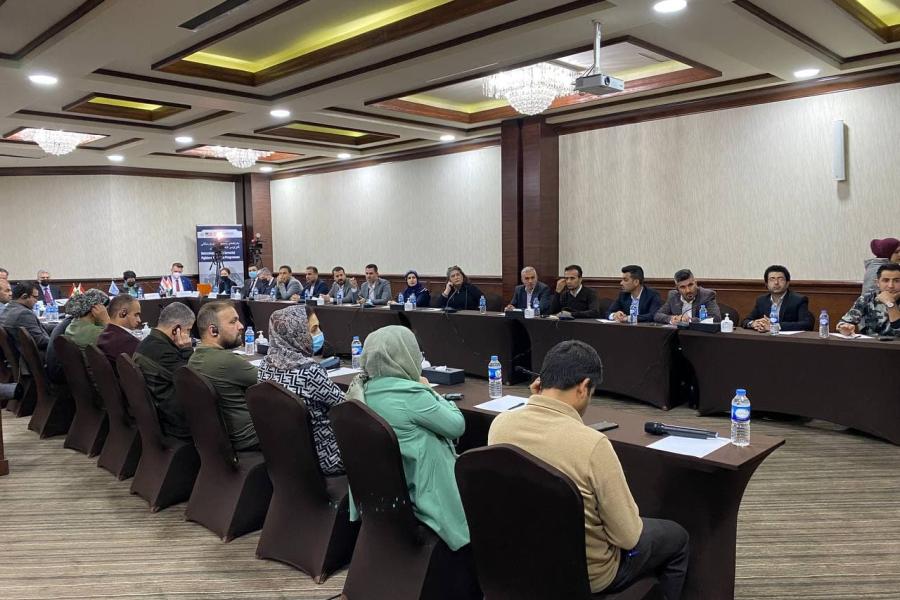The United Nations Office on Drugs and Crime (UNODC) and the Government of the Kurdistan Region of Iraq (KRG) address threats posed by foreign terrorist fighters (FTFs) through technical assistance to law enforcement, corrections, and justice sector
٢٩ نوفمبر ٢٠٢١

Erbil, Kurdistan Region of Iraq - 29 November 2021
With the participation of His Excellency KRG’s Minister of Interior Rebar Ahmed, Her Excellency Minister of Labour and Social Affairs Ms. Kwestan Mohamed, and Director General of the Social Reformatory Department of KRG Mr. Ahmed Najmaddin, as well as Consul General of the United States of America in Erbil Mr. Robert Palladino, and UNODC International Programme Coordinators, as well as several high-profile international experts; UNODC-Iraq Launched the first Training workshop on the “Risks and Needs Assessment (RNA) Protocols in Prisons and the Related Sentence Planning, and Developing policies and protocols for the implementation and operation of a specified risk and needs assessment for terrorist and FTF prisoners” for the managers and staff of the prisons and reform centers under the jurisdiction of the Kurdistan Regional Government. This workshop is within the Framework of the Returning Foreign Terrorist Fighter Detention Programme (FTF) implemented by the UNODC Regional Office for the Middle East and North Africa (ROMENA).
In his opening remarks, Mr. Ali El-Bereir, Senior Programme Coordinator and Head of UNODC Office in Iraq, warmly welcomed the Senior government officials, USA Consul General, participants as well as experts and stated that “The main purpose of this programme is to enhance capacities of partner government Ministries and Departments to manage threats posed by foreign terrorist fighters (FTFs) through providing technical assistance to the sector of Crime Prevention and Criminal Justice. He added that UNODC is working very closely with the Federal Government in Baghdad and also the Kurdistan Regional Government, and has established strong cooperation based on shared objectives, priorities and mutual trust to implement this programme successfully across Iraq” and thanked the United States for their generous funding to this programme. Mr. EL-Bereir, highlighted the programme’s aim to develop tailored and gender-sensitive strategies to address and counter-terrorist narratives within the prison system, consistent with national priorities, international humanitarian law and human rights law, as applicable and in accordance with relevant international law such as United Nations Standard Minimum Rules for the Treatment of Prisoners, known as (the Nelson Mandela Rules).
On behalf of the Kurdistan Regional Government, His Excellency, Mr. Rebar Ahmed, Minister of Interior expressed gratitude to UNODC and USA for this much needed support to strengthen relevant government departments’ capacities to manage and mitigate the threats posed by the terrorist prisoners. Mr. Ahmed highlighted the difficulties and challenges posed by terrorist prisoners and the need for violent extremism prevention strategies and policies at prisons and reform centres. Minister Rebar expressed the government’s full cooperation and openness to bring in international best practices and to benefit from the UNODC’s technical expertise to enhance prison management systems in Kurdistan in line with the human rights laws and standards.
Furthermore, Ms. Kwestan Mohamed, Minister of Labour and Social Affairs delivered a remark and thanked UNODC for this initiative and technical assistance to the prisons and reform centres under her Ministry’s mandate. The Minister stated that the purpose of prisons needs to be changed from detention and punishment centres to rehabilitation and reform centres to help the offenders to heal and reintegrate into society after completion of their sentences.
“An integral part of the international community’s efforts to counter terrorism and stop the flow of foreign terrorist fighters is bringing perpetrators of terrorist acts to justice and holding them to account for their actions, in accordance with the rule of law and human rights”, said Mr. Robert Palladino, Consul General of the United States in Erbil in his address to the audience and he added that since 2011, the United States has supported partners around the world by increasing awareness of humane terrorist prisoner management practices and helping them to institute reforms to address further radicalization of terrorists in prisons. This week’s workshop is the first in a series of events designed to help Iraq manage and mitigate the security risk posed by terrorist and foreign terrorist fighter prisoners and to prevent radicalization to violence of other prisoners in its prison systems.
Mr. Torben Adams, UNODC International Programme Coordinator presented an overview about the objectives of the RNA and highlighted that in April this year, the United Nations system as a whole has developed and adopted a Common Position on Incarceration, with a common framework for UN support to the Member States on incarceration-related matters. The Common Position reiterates that prison systems around the globe continue to face fundamental challenges that undermine the ultimate purpose of a prison sentence. Instead of protecting society from crime and preventing re-offending by preparing prisoners for their social reintegration upon release, over-incarceration, prison overcrowding, neglect and abuse rather reinforce inequalities, exclusion and marginalization in many countries. He stated, “The Common Position firmly positions prison reform and the treatment of offenders as urgent justice and rule of law priorities, and as an integral part of the 2030 Agenda for Sustainable Development’s commitment to “leave no-one behind”.



